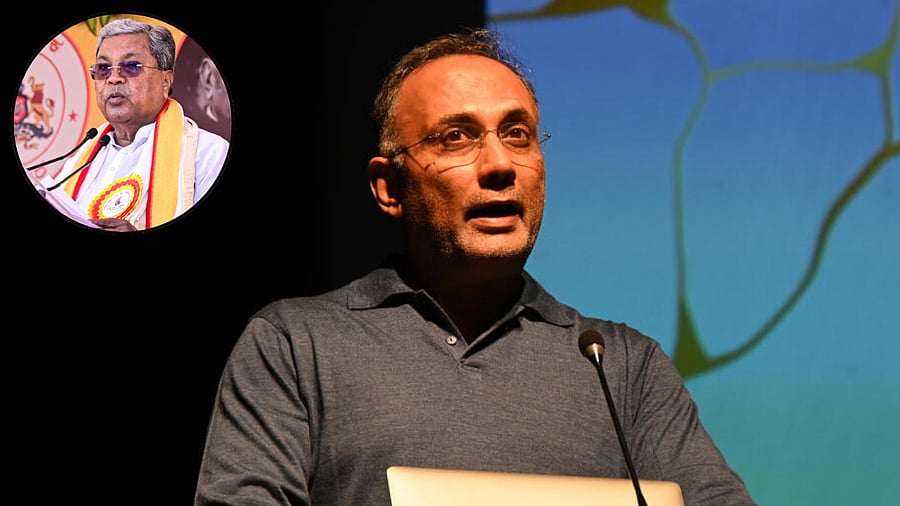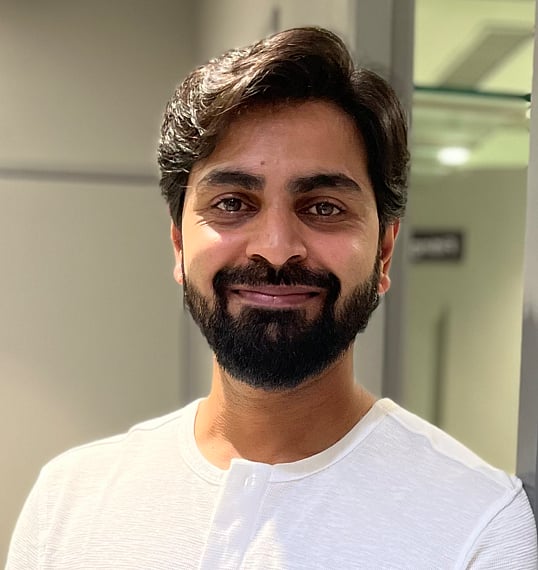
Karnataka Health minister Dinesh Gundu Rao, (inset) State CM Siddaramaiah.
Credit: DH File Photo
Bengaluru: The governing Congress is completing two and a half years in office amidst political uncertainty. Health Minister Dinesh Gundu Rao, a former Karnataka Congress president, gets candid with Bharath Joshi on the goings-on. Excerpts:
Q. How do you describe your government's performance at the halfway mark of its tenure?
A. We've been successful in the implementation of our pioneering 'guarantee' schemes. More wealth is being created and shared. That is a major achievement despite stepmotherly treatment by the Centre in terms of tax devolution, drought relief and dishonouring budget announcements. There are numerous new ideas, policies and programmes across various departments.
Q. What about criticism that your government hasn't gone beyond guarantees?
A. The guarantees are so huge that they overshadow many other initiatives. There are big projects and funding for Bengaluru's development. There are many new hospitals and programmes in my department—for example, chemotherapy centres in government hospitals. New schools, gig workers’ welfare schemes, irrigation projects, and reforms... We've not fallen behind in anything.
Q. Congress came to power on an anti-corruption plank. But the predominant view is that Congress and BJP are the same when it comes to corruption.
A. Given the way corruption exists in our political system, nobody can claim to be 100% above board or say that they've fixed everything. We're trying to bring systemic changes. In postings and transfers, my department is completely transparent. We did 5,500 transfers last year, all based on counselling. There is now counselling for sub-registrars—their transfers were part of a big racket—and for excise officials. These are major decisions. We are also trying to improve the KPSC. Did the BJP government take a single decision to reform the system? It is not that we've done nothing.
Q. What about retail corruption, the kind that people face everyday in public offices?
A. If we ensure zero corruption in recruitment and transfers, the system will automatically improve. An officer who pays to get a posting will make money on the job. When we transferred 5,500 employees, they occupied key positions without meeting me or any MLA. Of course, we don't know if they're good or bad, but at least they’ll know that they haven't paid for their posting.
Q. Do you think the government requires a course correction?
A. We need more focus on infrastructure, especially roads—not just highways. I am talking about smaller connecting roads. We also need to think about the growth of cities outside Bengaluru, like Mangaluru, Mysuru, Belagavi, and Hubballi-Dharwad. We should tap their potential.
Q. Is Cabinet reshuffle a course correction?
A. A reshuffle is not a course correction. It is about giving opportunities to people who are good and experienced. This is left to the discretion of the chief minister and the high command. A reshuffle will happen, but discussions haven’t started.
Q. What about a change in leadership?
A. We have a capable person as the CM who has got a grip on things. He is the most popular leader across all parties in Karnataka. I am not happy that this discussion is taking place when we have a tall leader like Siddaramaiah as CM. It is not good for the government.
Q. We’re also hearing assertions that Siddaramaiah is indispensable.
A. He is definitely indispensable. He is a crowd-puller. People trust him. He is absolutely necessary in whatever role he plays. For Congress to return to power next time, he is indispensable.
Q. Where does that put Deputy CM DK Shivakumar’s aspirations?
A. There will be aspirants. The decision will be taken by the high command. Whatever decision is made, it will be done along with Siddaramaiah, not by leaving him out.
Q.There was a spate of maternal deaths. What’s the situation now?
A. It was a really challenging time for me. People lost lives... Our system, which I headed, failed them. We acted swiftly. We ordered an audit whose report was published. We now have a major programme to improve the system and plug the gaps. This year, there has been a 25% drop in maternal deaths. By 2028, we want to bring down the maternal mortality rate (MMR) to 40 per one lakh live births. Now, it is in the range of 58-60. By 2030, we want MMR to touch 20.
Q. What about shortage of doctors?
A. We filled up the vacancies by giving first priority to medical students from government-quota seats. This time, we got 1,600 MBBS doctors, all of them meritorious. They will work for one year. Then, the next cycle will come. We have synchronised this. The new lot will come in before the current one leaves. We have said that PG doctors should also work in rural areas, but the matter is in court. There is a human resource crunch when it comes to nurses and technicians. We are doing redeployment based on workload. This has caused some friction within the department.
Q. As the Brahmin face of the government, you opposed the Social & Educational Survey.
A. I wrote a letter against the use of nomenclature such as Christian Brahmin, Muslim Brahmin etc. That was my limited objection. The survey itself is good and should happen. Some communities had doubts and I don't know why.
Q. Even the Akhila Karnataka Brahmana Mahasabha opposed it, saying Brahmins will not benefit from the survey.
A. A scientific study will reveal the real status of Brahmins. You say Brahmins are well-off or highly-educated. But there are many who're not well-off or educated. They'll need programmes, for which proper data is required. We established a Brahmin Development Board because the community needed support. Let the Mahasabha say that the Board isn't required and that they don't need any support.
Q. As the minister in charge of Dakshina Kannada, do you think the decision to form an SIT in the Dharmasthala case brought a bad name to the government?
A. The way the case was being projected—mass murders, rapes, suicides—the numbers were crazy! I was in favour of an investigation by the capable local police. Today, in Dakshina Kannada, we have been able to bring peace with good officers and strict enforcement. But the perception was that the local police would hush it up. So, we formed an SIT, and everyone welcomed it. But when the SIT didn’t find anything as was claimed, the BJP rose.
Q.Your government was accused of tarnishing a Hindu institution.
A.Those who claimed there were mass murders and all that are the ones who have now gone to court against the SIT. The investigation was turning against them. They are the ones in trouble today. In fact, [Dharmasthala Dharmadhikari] Veerendra Heggade has received a kind of clean chit. And, if we hadn't done anything, the government would’ve faced criticism that we were trying to protect Heggade. The needle of suspicion would have remained on Dharmasthala.
